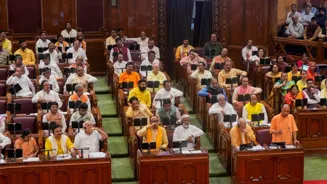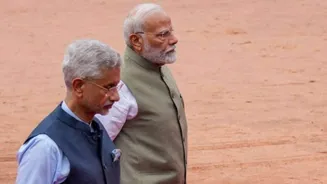On the final day of the monsoon session, the Uttar Pradesh Assembly witnessed a rare consensus as ruling and opposition benches came together to unanimously pass the State Legislature Members and Ministers
Amenities (Amendment) Bill, 2025, enabling the first revision of salaries and perks for MLAs, MLCs, and ministers in nearly a decade.
The passage of the Bill marks the first time during Chief Minister Yogi Adityanath’s tenure that lawmakers’ compensation has been revised. The last increase came in August 2016, under the Samajwadi Party government, making this revision a long-awaited move that leaders across party lines had been demanding.
Under the new provisions, legislators’ basic salaries have been increased from Rs 25,000 to Rs 35,000 per month, while ministers will now draw Rs 50,000, up from Rs 40,000 earlier. But the basic salary is only one part of the package — allowances form a substantial share of what lawmakers take home.
State Parliamentary Affairs Minister Suresh Khanna, while tabling the Bill, said: “The last revision was done in 2016. Since then, prices have risen sharply. It has become necessary to revise salaries and allowances to reflect present realities.”
Constituency allowance has risen from Rs 50,000 to Rs 75,000, medical allowance from Rs 30,000 to Rs 45,000, and telephone allowance from Rs 6,000 to Rs 9,000. The daily allowance for public service has been revised from Rs 1,500 to Rs 2,000, while the session allowance payable during Assembly sittings has gone up from Rs 2,000 to Rs 2,500. Railway coupons, meant to facilitate lawmakers’ travel, have also been increased from Rs 4.25 lakh to Rs 5 lakh annually.
This means that each MLA will now receive around Rs 67,750 in monthly salary and allowances, while ministers will draw approximately Rs 77,750, excluding additional benefits such as secretarial support, travel reimbursements, and medical facilities.
The Bill extends benefits not just to sitting legislators but also to former members. Monthly pensions have been increased from Rs 25,000 to Rs 35,000, while family pensions will now be Rs 30,000 instead of Rs 25,000.
A provision has also been introduced for incremental pensions: any former legislator who has completed six years in office will be entitled to an additional Rs 2,000 per month, with the amount increasing by Rs 2,000 for each additional year of service. Even if a member’s tenure extends beyond six months, it will be counted as a full year for pension calculations.
Railway coupons for ex-legislators have been increased from Rs 1 lakh to Rs 1.5 lakh per year, divided between Rs 50,000 worth of rail and air travel and Rs 1 lakh in cash for fuel and private vehicle expenses.
Interestingly, the committee that studied and recommended the revisions represented a cross-section of Uttar Pradesh’s political spectrum. Alongside Khanna, the panel included leaders such as Mata Prasad Pandey (Samajwadi Party), Ashish Patel (Apna Dal), Rajpal Balyan (RLD), Sanjay Nishad (Nishad Party), Om Prakash Rajbhar (SBSP), Aradhana Mishra ‘Mona’ (Congress), and Raghuraj Singh ‘Raja Bhaiya’ (Jansatta Dal).
“This was a unanimous decision. Lawmakers across all parties felt that rising costs had made a revision necessary,” Khanna told the House.
Supporting the move, Aradhana Mishra ‘Mona’ of the Congress said: “The hike was long overdue. It is important to remember that lawmakers also incur significant costs in meeting the expectations of their voters.”
Senior Samajwadi Party leader Mata Prasad Pandey also echoed the sentiment: “It has been nine years since the last increase. Given the rising cost of living, this revision is only fair. Even during difficult debates, this was one issue on which all members agreed.”
The government estimates that the revised entitlements will cost the state exchequer an additional Rs105.21 crore annually. Addressing concerns about the financial impact, Khanna said: “Yes, there will be an additional burden of Rs105 crore annually, but it is a justified expense. Legislators need adequate resources to serve their constituencies effectively.”
Crucially, the Bill also introduces a mechanism to avoid such long delays in the future. Salaries and allowances will now be automatically revised every five years, indexed to the cost inflation index under Section 48 of the Income Tax Act, 1961.
For Yogi Adityanath, who is into his second term as Chief Minister, this is the first such pay hike to be cleared for legislators and ministers. The consensus across party lines ensured a smooth passage in the Assembly, free of the acrimony that often accompanies debates on lawmakers’ pay.
For many MLAs, the revision is not just about personal income but also about meeting the increasing costs of public life — ranging from constituency travel and office maintenance to the rising expectations of constituents.
However, with the new structure coming into effect from April 1, 2025, Uttar Pradesh’s 403 MLAs and 100 MLCs will take home more each month, along with enhanced pensions and travel perks for former members.















